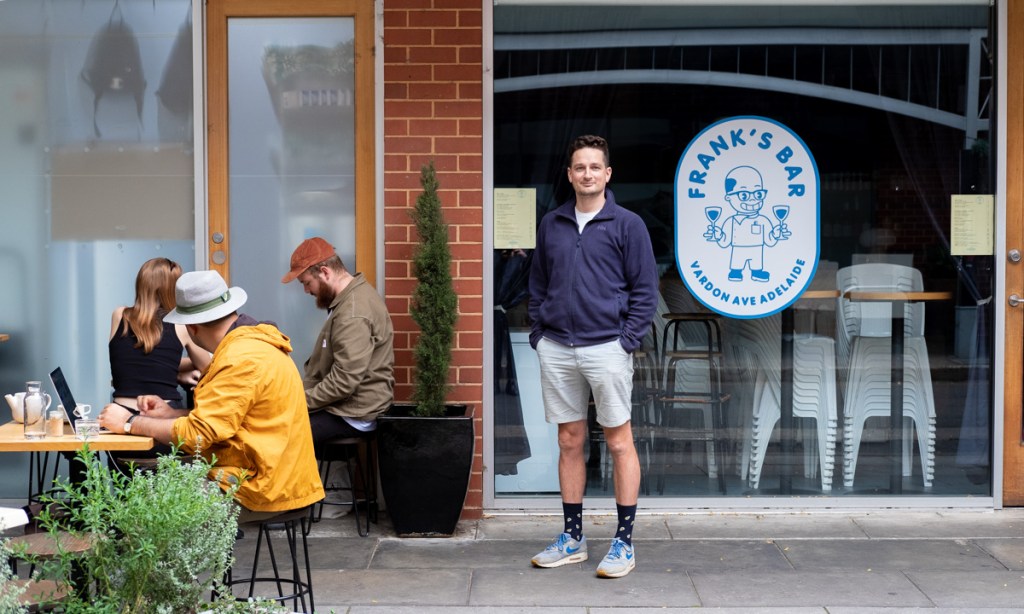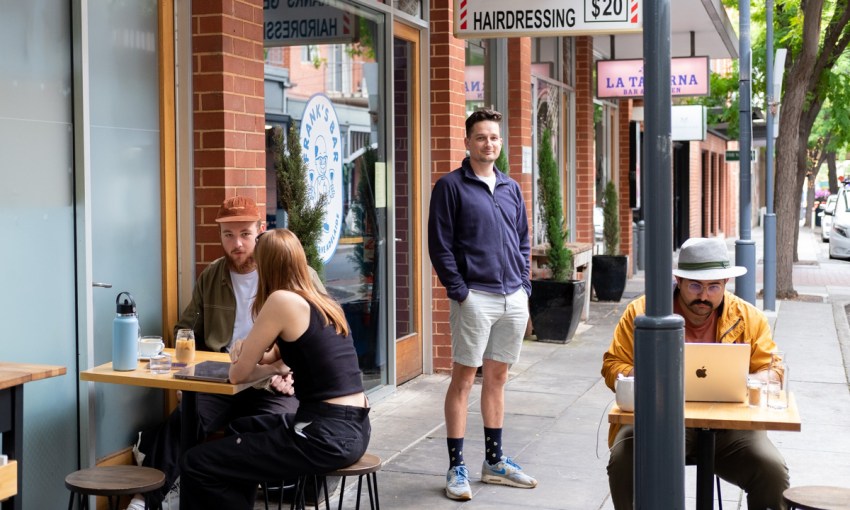For the second time in its 10-year history, Exchange will expand into a neighbouring property to meet its growing demand. Ahead of the café's short-term closure next month, we speak with founder Tom Roden about choosing slow and sustainable growth over hubristic hype.
Exchange Coffee will temporarily close in April
In early April, East End coffee shop Exchange will cease its usual operations, close its doors for a few weeks, and sling coffees from a cart out the front.
The closure will allow a new version of the café to be constructed, as founder Tom Roden expands the business into its former next-door neighbour, Franks Barber Shop.
This is the second expansion the business has undergone in its almost 10-year history, and, as was the case the last time around, post-refit Exchange will be much the same as pre-refit Exchange.
There will be noticeable physical changes, but Tom doesn’t plan on expanding Exchange’s hours or introducing new elements like a liquor licence. It will be the Exchange you know, with a bit more seating.
This news does not make for a sexy headline (FIRST LOOK: Café gains additional square-metreage!), but Exchange’s story is a useful guide to the banality of success in small business.
Do something well, do it consistently, and you’ll find your audience – eventually. Stick to it for long enough, and that audience might even grow.
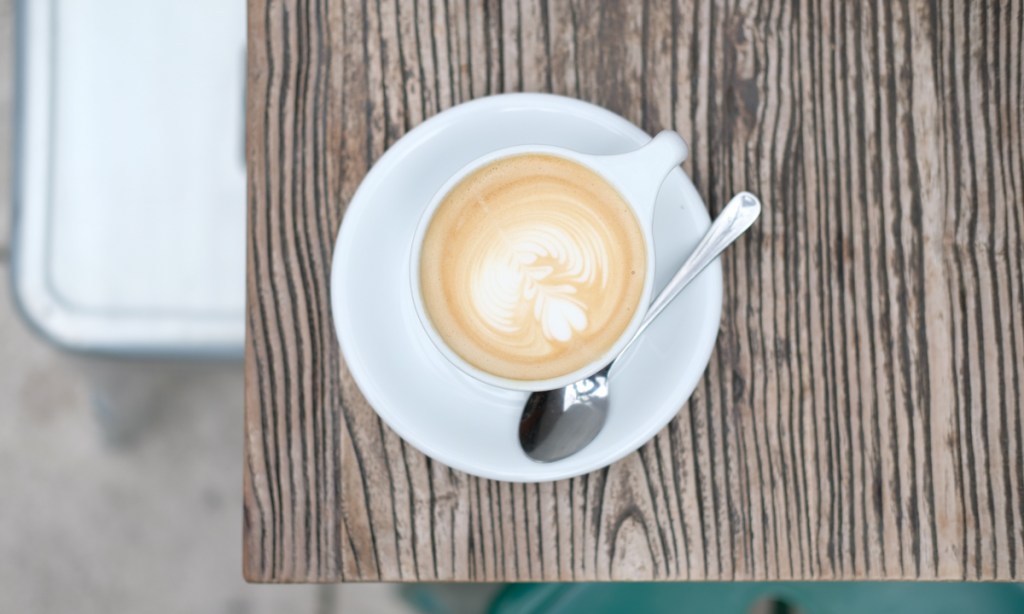
Exchange won CityMag’s inaugural Adelaide City Coffee Championships in 2019
Adelaide’s hospitality scene has changed a lot since Exchange first opened in July 2013. Interstate operators have flown in, bought in, and flown back out having harvested a ripe investment. Hospitality businesses that were foundational to Adelaide’s current bar and café culture have been sold off to new owners. Longstanding hospitality groups have expanded and contracted, and new ones have been created for the express purpose of purchasing a portfolio of existing successes.
All the while (except for a brief sojourn into Small Bar Land in 2017), Tom has focussed on maintaining Exchange’s simple formula: excellent coffee, food and service.
As Adelaide’s hyperactive hospitality scene returns to is frothy pre-COVID peak, we speak with Tom about dodging the hype cycle and building a long-lasting, sustainable and well-loved business.
CityMag: How are you?
Tom Roden: Oh man, my life is extremely busy at the moment. Kind of sickeningly busy.
That’s in addition to work stuff?
Yeah. We’re having our second baby, due in early May.
How old is the first?
Three and a half. He will be three and a half by the time the baby comes.
How has becoming a parent affected your life as a business owner?
Becoming a parent resets everything that you maybe once thought. It redefines your purpose in life. Or, maybe not redefines it, but it makes it very clear what your purpose in life is. It’s made me more driven to succeed, because I feel like there’s a lot riding on life, so I want to make sure I can run a more viable business and support my family.
—Tom Roden
Was small business always going to be the way you were going to go? There are less risky ways to make money.
I fell into this, in a sense, given that I just worked in cafés to fund my student life. I never expected I’d actually find myself running a business. I feel like in some senses I’m pot-committed and I’ve got to keep going for a lot of reasons – but not because I have to, because I want to as well. I appreciate what we have here and I want to make sure we can build on the extraordinary opportunity that we have in this spot.
What was the business you thought you were opening in 2013?
The original concept – when we were two-thirds the size of what we currently are now and half as big as what we will be – was a pretty simple coffee bar with a really focussed offering: just espresso, filter coffee. No real extraneous beverages. At that point in time, we were serving a handful of pastries and some house-made sandwiches. And that was really the intention, to borrow from my experience in London and try and recreate that here.
Adelaide 10 years ago was very different to how it is now, and certainly extremely different to London, and it became clear to me fairly early on – within the first year, I’d say – that the model I was working towards might struggle.
The market was pretty under-developed at that stage.
Absolutely. And I felt that, with the two or three years of really hard graft to get us established and off the ground. In those formative years, we tinkered with it a little bit. We didn’t really change much in the way of what we offer in terms of drinks. What we have done is expand what we’ve done in terms of food.
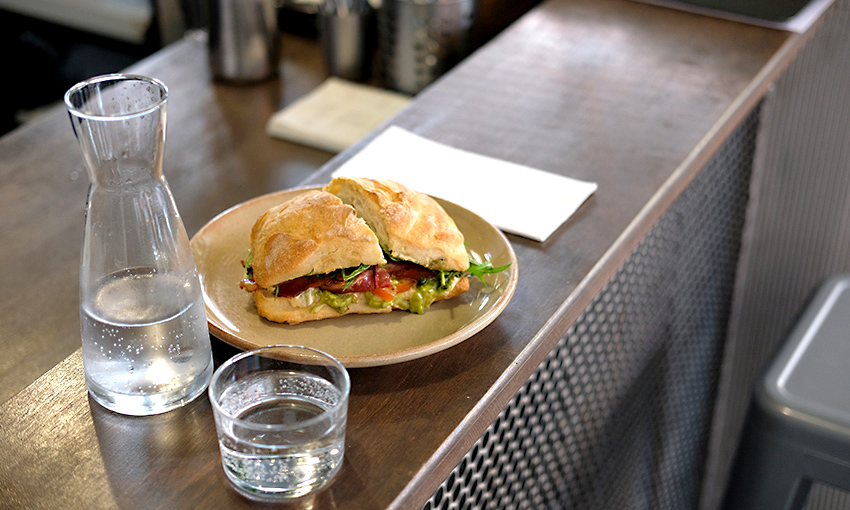
Exchange’s cult sandwich, The Wallace. This picture: Joshua Fanning
What were some of the fortuitous elements of the first version of the business? The location is pretty incredible. Was that luck?
The location was absolute dumb luck. It’s all hunky-dory now, but 10 years ago, on Vardon Avenue, we were the only hospitality business here. There was no Mother Vine, there was no NOLA. East End Cellars were across the street where Mother Vine is and they were just a bottle shop, doing retail sales. Doing my early research on the area, I came out a couple of mornings to count footfall here, just to see what was going on in this precinct at coffee o’clock, and the numbers were not encouraging. They probably were in the dozens over a period of a few hours in the morning. We took a punt on it anyway, and many years later we’re well established, and so is this precinct.
New here? Sign up to receive the latest happenings from around our city, sent every Thursday afternoon.
What else did you get right at that moment?
I think a commitment to our goal, and to not waver on that. I mean, sure, we adapted where we needed to, particularly what we did in terms of food, but I really wanted to stick to our guns and not deviate from what I thought I wanted to do. We didn’t go and add a whole bunch of products and services to our model just to service a broader demographic.
We’re not a catch-all business, we don’t appeal to everyone, and that’s fine. And in those early days, who we appeal to, that group was even smaller. It would’ve been very easy to make a few changes to make us appeal to a wider market or a wider demographic, and we very consciously didn’t do that – and it made it hard for a while. But I think that allowed us to lay a really strong foundation where we had a clear identity and a clear goal.
When did it stop feeling hard?
I don’t think it every stopped feeling hard. It’s just hard in a different way.
But when did that start to feel like a narrow focus was the right bet?
I want to say 2017, around that time. Maybe 12 months or so on from when we did the first refit. That was only three and a half years into our operation. We had the opportunity to go next door, where we currently are, and that really financially put us right back to square one – or square minus-one – and it took, once again, a period of graft to poke our heads above water.

Tom Roden behind the Synesso in 2018. This picture: Joshua Fanning
How did you know it was the right time to expand back then?
It’s something we had to do. In mid-2016 it was becoming pretty clear that we had completely outgrown that space. Our ceiling was reached – in fact, we were probably above our ceiling, really, and it was a bit uncomfortable to be in there. The space wasn’t designed to cope with as much as we were doing at that time, and that was causing a whole lot of issues. So when my landlord told me that the jeweller next door was moving out, we had to jump on that, no matter how hard it would be financially to make that work. We couldn’t let that space get leased to someone else for another five years. That would’ve been terrible.
Do these types of opportunities come up very often?
Not really. Talk about fortune – we’re in a bank of what used to be four individual shops. We moved into two at the beginning. It’s pure fortune that we’ve had two adjacent neighbours move out in the right order.
I really don’t want to move from this place, because it’s great. We love the community, we love the precinct, and it would be a massive risk to uproot this and relocate it somewhere else. I imagine we’d lose a lot of people, because this location is fantastic. And I really don’t think that there’s another place in the city that has this particular mix of stuff that makes this little Vardon, Ebenezer, East End precinct what it is. I don’t think there is a place where I’d be comfortable replicating what we do here anywhere else.
How did discussions start about this new expansion?
We were aware that Frank may be hanging his scissors up at some point. He’s traded in the East End for some 60-odd years, I believe, so the inevitability of his retirement was on the front of my mind. When I started thinking about what we can do to keep growing, logically that was the best bet. I just asked to be kept informed of what Frank may or may not be doing, and he ultimately decided to retire at the end of 2022, so I had some discussions with the landlord about what we could do.
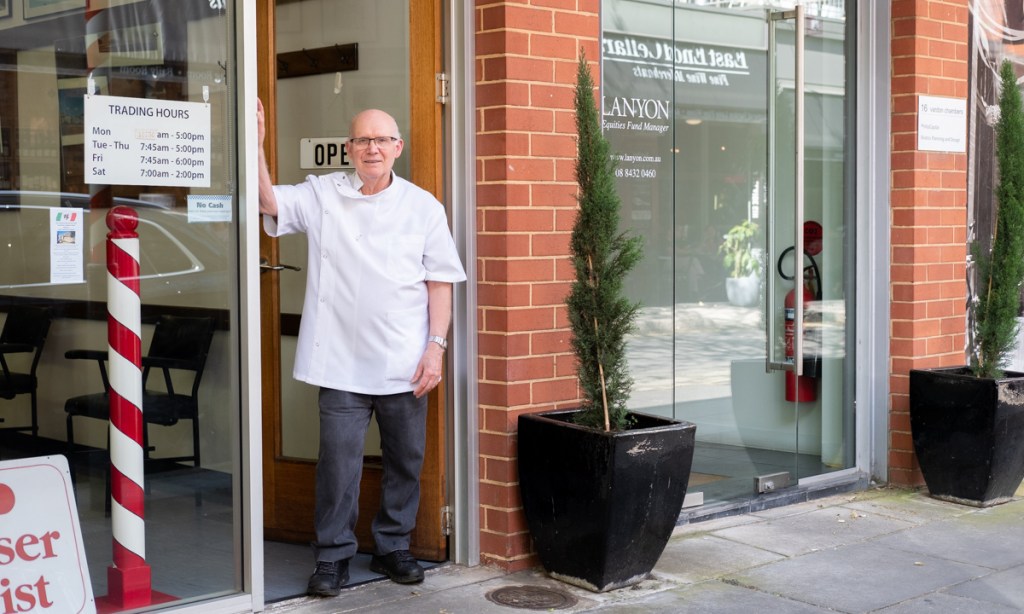
Former very-long-term East End tenant Frank Vaiana
What will the extra footprint do for your business?
We need to make this refit suit us for the next however many years – 10 years, say – so we really have to do a proper job of this. So it’ll be a total refit. We will have a new and expanded kitchen; we’ll have a new and expanded floor, front-of-house area. The format will remain more or less the same as it is now, but it’ll be expanded. So it’ll be more comfortable to be in, more comfortable to work in, and it’ll be a greater capacity to meet the demand that we are seeing.
Does expanded kitchen mean expanded offering?
I’m very conscious that we don’t want to reopen as some different café, right? We still want to be Exchange and we still want to make sure we appeal to the community that we’ve built around us. So we’re not intending to reinvent the wheel here. But certainly, what we’ll be able to do food-wise, we’ll be able to evolve that, improve it, bring some more interesting things to the menu. What we don’t want to do is reopen and people walk through the doors and: ‘Oh, this is a bit weird, isn’t it?’ People will be able to expect the same good things that we are doing now, but slightly more elevated, I hope.
Frank’s is a bar now. Why not try other things to broaden the clientele?
What we do is what I like doing. People have asked me over the years, ‘Why don’t you apply for a liquor licence? Why don’t you open in the evenings?’ et cetera, and I’m just not interested in it, to be honest. I like what we do and it keeps our business model relatively simple.
Sure, we could apply for a liquor licence and stock booze and open ‘til 10pm, but that makes things dramatically more complicated in all facets of running the business, and I’m really quite happy with the lifestyle it affords me, and my team as well. Speaking for myself, I enjoy being able to close the shop and go home and see my family and not have to work late into the night.
But then I guess the other thing is there are so many other businesses that ply that nighttime trade, that alcohol-centric trade really well, and I respect that, and I don’t really feel the need to compete with that, either.
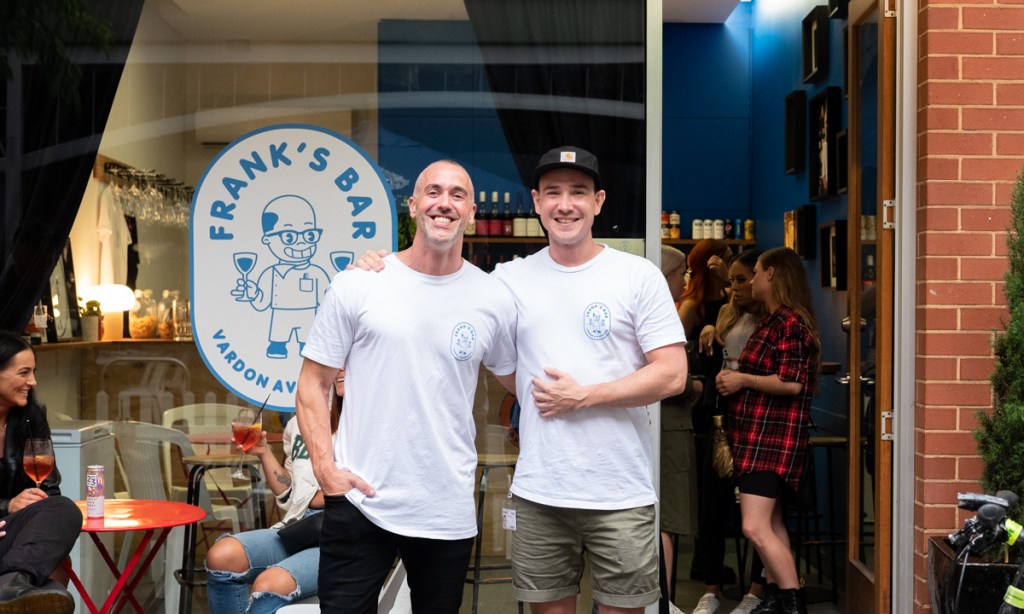
Current short-term tenants at Frank’s, Spe Caruana and Tom McLean
Is there a growth point you’d stop at?
In this space that we’re in now, we can’t get any bigger. If we wanted to expand beyond this, we would have to look at a second site, and I’m in no hurry to entertain that idea. I would never say no, but I don’t feel like I need to go and open six smaller stores to grow. That sort of expansion carries a lot of risk, particularly in Adelaide.
Some people that open small businesses are really motivated by that, they’re motivated to try and make their mark, in a way. And some people do that really well; they open multiple stores across multiple different industries, or segments of the hospitality industry, and they do that really well. That’s not really a big driver for me. I’m much more concerned about running a business well, keeping it sustainable, creating a good environment for our guests and our staff, and for me personally, facilitating a lifestyle that suits me.
How do you find balance in growing a business sustainably?
Business has to grow to remain sustainable. That’s the hard thing, I suppose. You’ve got to have the capacity for growth, because if you hit a ceiling all you’re going to find is the floor keeps rising. All you have to do is look at what’s happening at the moment with inflation – everything becomes more expensive. If you can’t bring more money in to counter that, then you’re going to run a business that, ultimately, will run out of money. It’ll fail. So yeah, there’s a line there that you have to straddle where you want to be able to grow but do it in a sustainable way, and I guess that’s what we’ve been doing here for 10 years.
There might be a time in the future where we’re, like, ‘Oh man, we can’t do any more business and we need to look at another method of growth’. That might be a bridge we have to cross at some point. For the time being, I’m really quite content with organic growth, growth that just happens over time. We’ve been able to make it sustainable for ourselves so far, and I’m confident that it can continue into the future.
What will Exchange be doing during the build period?
We don’t know exactly how long we’ll be closed for, but there will be a hard closure at some point in early April while the initial works are done to the space. But we are really excited to be running a coffee cart for a period of time while we are closed so that we can keep that connection with the community and keep some staff employed. We don’t know how long that’ll run for, but, for example, if we are closed for six weeks, then we would hope to run the cart for four, or something like that.
This conversation has been edited for clarity and concision.
